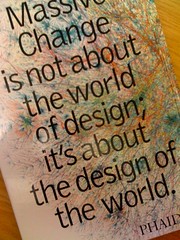Massive Change: Design Challenge
An excerpt from Massive Change by Bruce Mau and the Institute without Boundaries:
“A city needs to have a daily plan and daily processes that encourage constant learning.”
“Every child should know the design of his or her city. They should design the city even, because if you can design the city you can understand the city. If you understand the city, you will respect the city.”
I think this can be applied to the education system directly in two ways: curriculum development and refinement, and professional development.
What if current education stopped and students were motivated to design a functional curriculum with the future of the class, school, city, country, and whole world in mind? How could you motivate such a thing?
Design is the key term; the book’s rear cover states, “Massive change is not about the world of design; it’s about the design of the world.”
Motivating students to design is something I’ve experienced in my classroom. It can be simple or complex. Most students feel major intrinsic incentives when a design challenge is posed. Some students enjoy the sense of competition. The “think, pair, share” model also works well where all individuals are asked to think about a problem first on their own, then share their ideas with a partner, then with a larger group.
The design process also involves making and understanding mistakes.
Sometimes students can be motivated but not be able to express it in a useful or meaningful way. Sometimes different behaviors can make improvement difficult. Students who let these things stop them need guidance through the process.
Sometimes the process can be improved or revised. The process should always be in question by teachers and students. Not all students buy in, but a large majority do, and positive change occurs. Most classrooms work this way.
Can we ask students to design the next unit, project or skill acquirement? Can it be taken steps further by asking students to meet this basic objective but include larger goals of making a significant positive change in their class, school, city, country, and whole world?
I think a motivational prompt and putting this challenge to classes or groups could be useful in small or large scales. If any project is broken down into small steps, with deadlines and accountability, it is usually successful.
The concept of students designing their learning with the big picture and big change in mind could lead to positive change.
I think the same concept applies to professional development in education. What if every professional educator designed a professional development plan with massive change in mind?
What do you think?
Leave A Reply
You must be logged in to post a comment.


Comments
I am going to try to do more of this type “stuff” – designing their own projects- with my engineering students the 4th marking period. My architecture students created their midterm project – all the guidelines and requirements. They completed it, and the projects were great…best part was, I rarely had to tell them to stay on task!
In regards to professional educators designing their own PDP – I think this would be an amazing idea. There are so many things that I would like to work on with my department and other departments, but there simply isn’t enough time! I think being able to work on my own design would encourage me to see it from start to finish.